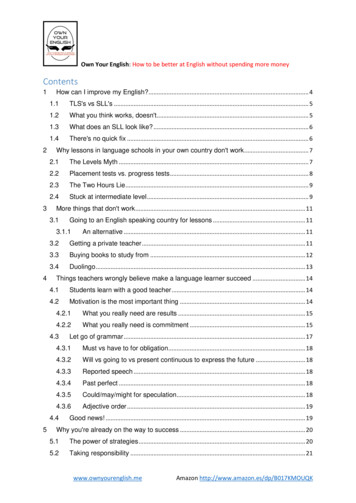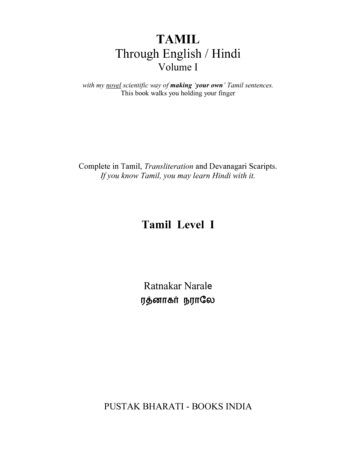
Transcription
Own Your English: How to be better at English without spending more moneyContents123How can I improve my English? . 41.1TLS's vs SLL's . 51.2What you think works, doesn't . 51.3What does an SLL look like? . 61.4There's no quick fix . 6Why lessons in language schools in your own country don't work . 72.1The Levels Myth . 72.2Placement tests vs. progress tests . 82.3The Two Hours Lie . 92.4Stuck at intermediate level . 9More things that don't work . 113.1Going to an English speaking country for lessons . 113.1.143.2Getting a private teacher . 113.3Buying books to study from . 123.4Duolingo . 13Things teachers wrongly believe make a language learner succeed . 144.1Students learn with a good teacher . 144.2Motivation is the most important thing . 144.2.1What you really need are results . 154.2.2What you really need is commitment . 154.3Let go of grammar . 174.3.1Must vs have to for obligation . 184.3.2Will vs going to vs present continuous to express the future . 184.3.3Reported speech . 184.3.4Past perfect . 184.3.5Could/may/might for speculation. 184.3.6Adjective order . 194.45An alternative . 11Good news! . 19Why you're already on the way to success . 205.1The power of strategies . 205.2Taking responsibility . 21www.ownyourenglish.meAmazon http://www.amazon.es/dp/B017KMOUQK
Own Your English: How to be better at English without spending more moneyCreditsCover design by L.E. Sanders using hands icon by Diego Naïve fromwww.nounproject.comAll words copyrighted to L.E. Sanders, 2015.www.ownyourenglish.meAmazon http://www.amazon.es/dp/B017KMOUQK
Own Your English: How to be better at English without spending more moneyOwn Your EnglishLearn English faster, cheaper, betterWho is this book for?This book is for you if any of the following apply: You've studied English in a school but don't feel you've mastered it.You've plateaued at around intermediate level.You know all the grammar but you can't speak well and often don't understandwhen you hear English.You don't feel challenged, motivated or interested by English classes with ateacher.You don't want to spend a lot of money learning English. In fact, you don't wantto spend any money on it!You don't want to spend your free time going to classes to learn English.You hear fluent speakers of English and wonder how they did it and whyyou can't.This book starts from that last point and gives you the answer. You can be like thosepeople who've become fluent at English. You can find out how they do it.This book will show you what doesn’t work for learning English so you stop wastingyour time and money. Then I will guide you through the strategies that do work: thestrategies that Successful Language Learners use. And the best thing is they're eitherfree or very cheap.Learn the secrets of Successful Language Learners and you can get to thelevel of English you want without wasting any more money or time.www.ownyourenglish.meAmazon http://www.amazon.es/dp/B017KMOUQK
Own Your English: How to be better at English without spending more money1 How can I improve my English?The number one question any language student wants the answer to is:How can I improve my English?If you're reading this book, you want to know the answer to that question too. Justlike millions of other people around the world.I can tell you the answer. I know the secrets of learning English. I know whatsuccessful language learners do. There's no mystery why some people are moresuccessful at learning languages than others. Successful learners get results bydoing things that you can do yourself, if only you knew what to do. If you follow theirsecrets, you can learn the language you want – to as high a level as you want.The language doesn't have to be English. It might be Spanish or Chinese. It is justthat English is the language millions of people around the world want to learn. It's thelanguage that spawns an industry worth billions of dollars. Those billions come fromthe pockets of people like you. And it's money that's mostly being wasted on thingsthat don't work.The best part is that the answer to how to speak better English doesn't mean spendinga lot of money. In fact, the best techniques, the ones used by successful languagelearners, are free or very cheap. Some of them are things you do anyway, in yourregular life in your own language.As a teacher, I know a lot about ELT (English Language Teaching) as it's called in theindustry. I have two teaching qualifications – the industry standard, entry-level TESOLcertificate and a Masters in English Language Teaching. I spent 12 years working asan English teacher in England, Australia, Thailand, Spain, Turkey, Qatar, Japan andThe Czech Republic. I've taught children, teenagers, adults, business people,university students and people studying for internationally recognised languagequalifications, like IELTS and First Certificate.I've been to international conferences about ELT and I've listened to, read and spokenwith many of the experts in the field – people who've written books that are used onteacher training courses, people that have earned lots of money researching andcreating methodology books to train teachers to teach English better.I've also written four books for major publishers that help students learn English. ButI'm not going to tell you to buy those books. For one thing, they're not cheap. But themain reason is, those books don't hold the secret to learning English. The secrets I'mgoing to share with you in this book.www.ownyourenglish.meAmazon http://www.amazon.es/dp/B017KMOUQK
Own Your English: How to be better at English without spending more money1.1 TLS's vs SLL'sWhat this book is going to do is turn you from a Typical Language Student (TLS) intoa Successful Language Learner (SLL).TLS's are the majority. Let's describe one and see if you recognise him or her. Maybeyou have been a TLS; maybe you are one.A TLS probably has an English level of pre-intermediate to intermediate. They have afew course books on their shelves and a grammar reference book. They've not doneall the work in all the books that are on their shelf. They've been to at least onelanguage school since they left high school but it didn't make a huge difference to theirspeaking ability. They've seen most of the grammar of English but, when they speak,they concentrate on getting the grammar right even if they don't have a high level ofvocabulary. They aren't very confident in situations where they have to speak but,despite that, they need English for work or study.For a TLS learning English is a chore that has cost them money and time.By the time you finish this book, you'll never be a TLS again. You'll be an SLL – aSuccessful Language Learner.SLL's know what works and they don't waste time or money on things that don't. So,first, you need to know what doesn’t work when you're learning a language. You mightbe surprised by what’s on the list.1.2 What you think works, doesn'tThe first thing you need to know is that most of what you think you should be doing tolearn English is wrong. Here are some things you might have done, or be doing, orplan to do to learn English. Enrol in classes at a language school or university in your own countryGo to an English speaking country and taking classes thereGet a private teacherBuy course books and self-study books to help with grammar, reading,listening, writing and speakingDuolingoThey don't work.Here’s what academic research and teacher training tells language teachers thatstudents need: A good, knowledgeable, qualified, patient, approachable teacherMotivationwww.ownyourenglish.meAmazon http://www.amazon.es/dp/B017KMOUQK
Own Your English: How to be better at English without spending more moneyThey aren’t enough either. The most successful language learners don't rely on eitherof those things. What works is what SLL's do. What works is what's in this book.1.3 What does an SLL look like?An SLL probably has an English level that doesn't easily fit the conventional levels butthey speak fast, fluently and confidently with humour and personality. They have bookson their shelves, ordinary novels not textbooks, in their own language and English andmaybe a grammar reference book. They've read all the English books on their shelf.They remember some of the English they learned in school but most of what they knowhasn't come from formal study in a language school. They don't know the grammar ofEnglish formally, but when they speak, they concentrate on conveying the messagewith their high level of vocabulary and seem to get a lot of grammar right along theway. They are very confident in situations where they have to speak but, despite that,if you give them a grammar analysis task or exam-style reading task, they get confusedand demotivated.Compare that with the description of a TLS in 1.1. Which would you rather be? TheTLS or the SLL? If it's the latter, then this book is your way in.But we need to make one thing clear.One thing I'm not going to promise you is a quick fix.1.4 There's no quick fixLearning a language can't be done in X number of hours as so many schools andbooks promise before they take your money. The successful language learners I'mgoing to tell you about worked at it. But they worked in the right way, an effective way,a successful way. And they didn't spend any money getting there.Let's be clear. You're going to have to do some work. But the good news is, hard workdone the right way doesn’t feel as hard as hard work done the wrong way.The things you need to do to learn English are effective enough that they don't seemlike hard work either. Don't spend any more time and money doing the things on thatlist up there that haven't worked for you. Let me explain what doesn't work and why.www.ownyourenglish.meAmazon http://www.amazon.es/dp/B017KMOUQK
Own Your English: How to be better at English without spending more money2 Why lessons in language schools in your own country don't workThis is probably the biggest money-maker out there. A lot of people are making a lotof money selling this lie to people who want to learn English. Not all of them knowthey're selling a lie and there are millions of excellent, well-intentioned teachers whocare about their students and genuinely try to do their best for them. Even some of thelanguage school owners believe they're helping students.Nevertheless, those students are mostly wasting their money.Here’s the typical set up: A course that lasts for three months with one or two lessonsper week with a test at the end. Pass the test, move up a level. Repeat. Or take thetest, fail it, repeat the level as many times as it takes to pass the test.Those two paths aren’t as different as you might think because a lot of teachers 'teachthe test'. Teachers all know what that phrase means because their jobs can dependon doing it. It means knowing exactly what's going to be in the test and then preteaching specifically those items in the one or two lessons before the test. Sometimesteachers even give the test questions out as a class activity.Schools know that students won't be happy to keep paying for classes that don't seemto work so teachers have to do everything they can to make students feel they'reprogressing through the levels. And teachers risk losing their jobs if they repeatedlyfail students or have students who ask to change class.So students will often end up passing the level and moving up because they passedthe end of course test, not because their actual level changed. I call this the ProgressLie.2.1 The Levels MythTo add to the misleading of the Progress Lie here's another, if not a lie, a debatablepoint about levels. They don't exist in the neat and tidy way they are presented.Whatever they're called, Level 2 / A2 / pre-intermediate / low-intermediate, not allstudents fit into the mould of the level.Implicit in the idea of a level are the following (and more) points:He or she knows pre-intermediate grammar and vocabuses it correctlyspeaks with a pre-intermediate degree of fluencywrites, reads and listens to equal and comparable levels to pre-intermediatewww.ownyourenglish.meAmazon http://www.amazon.es/dp/B017KMOUQK
Own Your English: How to be better at English without spending more moneyThe levels are a convenient way to package courses and course books, but what doesit mean to 'know' the grammar and vocab? To recognise and understand it when youhear it? To actively use it?What does using it mean? Correctly all the time? Most of the time? More often thannot? What if you use it correctly but make some other errors more commonly found,or taught, at a lower level?What if you speak much better than you read and write, or know the grammar reallywell but don't speak well? Both of these are common student profiles. It's more usualto find students that understand more than they can produce i.e. their (passive)listening skills are better than their (active) speaking skills. But people don't fit suchconvenient boxes.I knew an American woman who worked as a music teacher in Turkey. Her Turkishspeaking was much higher than her listening because her job involved giving verbalinstruction but her students didn't speak to her – they played their instruments as their'reply' and she would then respond with more verbal instruction. She didn't fit the box.Given that the criteria for assigning a level are not likely to all individually match thepre-intermediate criteria, what is the best way to assign a level? Take the weakestscore as the level or the highest? Or average them?Whichever way is chosen, it's fairly likely that most TLS's could just as easily be in aclass one level up or down from the one they are in. Levels mean very little and placingemphasis on them serves schools and publishers more than learners.2.2 Placement tests vs. progress testsSome schools split the levels up into smaller and smaller units. Level 3 becomes Level3.1, 3.2, 3.3 and 3.4. Now you're stuck in one level for even longer but you feel likeyou're progressing. Level 3.1 might start with revision of things you did in 2.4 but haveforgotten. The rest of the content is split up across the levels. A lot of it looks a lot likethe things you did at Level 2, but with a bit more grammar analysis and reading at ahigher level. You've probably forgotten a lot of the words you saw at Level 2, but that'sOK because there are more words for you to forget at Level 3.The reason I know that very few people genuinely move up a level is this:There are two kinds of tests.Placements tests and progress tests.A placement test is the one you do when you enrol. You take it to find out your leveland are placed in the class that corresponds to that level. A progress test is one thatwww.ownyourenglish.meAmazon http://www.amazon.es/dp/B017KMOUQK
Own Your English: How to be better at English without spending more moneytests what you've learned on the course. On long term, non-intensive courses (andeven on full time courses in the UK where students have five hours a day, every day)I have always seen the same thing. The students whose placement test says 'upperintermediate' have much better English than the students who've moved up the levelsinto the upper-intermediate class.I worked for one school that operated in summer only. Our school ran for 7 weeks,with students attending anything between 2 and 7 weeks. We gave the students aplacement test and put them in classes. Some students would complain that in theirclasses at home they were in a higher class. We told them, fine, but this is your level.They weren't happy because they believed the Progress Lie their schools at home hadtold them.So, we were telling them the truth, right? However, the school had a policy that allstudents would automatically move up a level after 4 weeks. We told them theProgress Lie. And then we wondered why they came back next year and expected tobe in the level they had ended the previous year at!Most schools operate a version of the Progress Lie, but it's more evident on shortcourses. Unless a school periodically gives a version of a placement test, sometimescalled a level test or a proficiency test, there is no evidence you've improved your levelof a language.2.3 The Two Hours LieThe overarching lie schools are selling is that a couple of hours of classes a week isenough. They are promising a quick fix but they dress it up with homework and leveltests and the teacher tells students to get as much English outside the class as theycan because they know the course alone isn't enough. But that ignores the psychologyof paying for a class.For most things in life if we hand over money, we get what we paid for. Customers ata language school forget they're only paying for lessons and convince themselvesthey're paying for English. If they're paying, they're going to get what they want at theend – English. If they go to the lessons, they think they're doing their part of the 'hardwork'. They're right about one thing – that method is hard because it takes time – oftenyears, and money – thousands of dollars. But it doesn't work.2.4 Stuck at intermediate levelDo you know which level at any school has the most classes? Low intermediate andintermediate.www.ownyourenglish.meAmazon http://www.amazon.es/dp/B017KMOUQK
Own Your English: How to be better at English without spending more moneyThis could be partly explained by a normal distribution curve which says that themajority will fall in the middle of two points on a scale. It could also be that oncestudents reach a certain level, they decide to stop learning English. But that doesn't fitbecause most learners will tell you they want to speak English really well, not just tolow intermediate or intermediate level. There are two reasons the classes tail off:1. People get stuck at that level because nothing works to improve their Englishbeyond it.2. The successful learners realise that the strategies they've developed mean theyno longer need the classes.There's one time I'd recommend classes under this system: When you're an absolutebeginner. Classes are fun, progress is rapid because you go from knowing nothing toknowing some basics, and motivation stays high. After that, you're wasting yourmoney. But there are other things to suck your cash away too www.ownyourenglish.meAmazon http://www.amazon.es/dp/B017KMOUQK
Own Your English: How to be better at English without spending more money3More things that don't work3.1 Going to an English speaking country for lessonsMany language schools also have branches in 'sexy' places like London, New York,Dublin. They're very expensive. Then there are cheaper ones in smaller cities, lesscool maybe, but not bad places to spend a fortune in. The courses, they want you tobelieve, are better because you'll have twenty or more hours in one week instead ofone month and you'll be living there so you'll be immersed in English.The courses are sold as so good that even if you just go for two weeks, because that'sall you can afford and you can't get any more time off work/university, you'll improveyour English and make it all worthwhile.It's true, you'll study for more hours, but you'll have paid for the course,accommodation, flights, food and the inevitable sightseeing you'll do. It's also trueyou'll be immersed in the language but only if you don't spend any time at all speakingyour language with the other students who share your mother tongue.Most people completely fail to do the latter because, when you're away from home,it's too tempting and easy to spend time with people who you instinctively trust andfeel comfortable with. The worst people to spend time with when you're trying to learna language are other people who are learning it too because it's unlikely they'll makethe huge effort of speaking it all the time when your common mother tongue is justless tiring.3.1.1 An alternativeCutting out the biggest expense – the course – means you could still go to an Englishspeaking country, maybe for twice as long. Choose somewhere where there are fewerstudents from your country (so not the one that has a branch of a school in your homecity). Use the money you saved on course fees to go there and spend all your timetalking to anyone you can find. And if you can't afford that, find a tourist spot in yourown country and talk to English speakers there or get a job as a waiter or taxi driverand get paid to talk to them. Or find a charity or job abroad which you can work for ifyou can get a visa. Do anything but pay money to spend half your time talking to othersfrom your country in language lessons.3.2 Getting a private teacherThis has to be better because it can be one-to-one so you get more time speakingthan in a group class, right? And the teacher will create lessons especially for you. Awww.ownyourenglish.meAmazon http://www.amazon.es/dp/B017KMOUQK
Own Your English: How to be better at English without spending more moneygood teacher will definitely do that. An average teacher will just get a course book andwork through that.I used to make materials specially designed for my students and I prepared lessonsand marked homework in my free time. However, none of my students did more thanimprove their confidence and pick up a few new words.Why?Because they were making the same mistake as the TLS's at language schools. Theythought because they were paying for English lessons, they'd get English. They hadno strategies for learning. Even when I showed them the strategies. The fact they werepaying for lessons meant they were committing some time a week to it and could feelthey were doing something so didn't need to do anything else. It was the Two HoursLie all over again. Except this time they were the ones telling the lie. To themselves.If hanging out and chatting is what you want and you live somewhere with foreigners,find some and make friends. Not with teachers though as they don't want to spendtheir unpaid time helping you learn English. Meet regular people doing something youenjoy. Friends are free.3.3 Buying books to study fromJust like with language schools, there is a lot of money being made from people whowant to learn a language. The big course books sell in high volumes and have becomebrand names that any student who's been to a language school will recognise. Theyall teach the same things via very similar syllabuses and they're often written by thesame authors even when they're published by different companies. There aredifferences in style and methodology, but it doesn't matter because teachers areencouraged to add to them and most teachers have done the same training course.Just like with the language schools, the books promise a level in a certain number ofhours. Finish the book, take the test, move up to the next book. And just like theschools, which level of the book do you think gets written first and sells the mostcopies? Intermediate.The course books always focus on 'grammar plus skills' and a bit of vocabulary whileself-study books might take a narrower approach e.g. vocabulary, listening. They'renot free, they're not even cheap and they don't work. Even the academic researchersinto English Language Teaching can't agree on what works, probably because thereis very little real evidence to suggest any of it does.Most of the books are full of exercises with gap fills like 'How long have you . (learn) English?' or 'How much money have you . (spend)www.ownyourenglish.meAmazon http://www.amazon.es/dp/B017KMOUQK
Own Your English: How to be better at English without spending more moneyon English since you started?'. The answer is 'years' and 'a lot'. It's much more relevantand useful to think about those two answers than what form of the verbs goes in thegap. Gap fills are another thing that doesn’t work.If you do buy a book, it won’t be the book that makes you learn, it will be the strategiesyou employ to make the book work for you. But if you copy the strategies of SLL's –successful language learners – you'll see they don't use study books. So cut out theexpensive middle man and learn English like an SLL. Use their secrets from this book.3.4 DuolingoFind me someone who has become fluent in a language from using Duolingo. Or anyother app or website that promises you can learn a language. Even if it's free.Don't spend too long looking because you'd be better off spending that time readingabout what SSL's do. You won't find any that owe their fluency to Duolingo. You can't.There aren't any.But Duolingo, or another app like Memrise, isn't all bad. For starters it's free. PlusDuolingo isn't bad for learning some basics and getting them to stick because itreminds you when you haven't studied something for a while and tests whether youremember it or not. And it's quite fun. So use it, but don't think it's enough. As part ofa strategy for learning a language it might do you some good.Now let's look at what teachers think students need to learn a language and whythey're wrong too.www.ownyourenglish.meAmazon http://www.amazon.es/dp/B017KMOUQK
Own Your English: How to be better at English without spending more money4 Things teachers wrongly believe make a language learner succeedMost teachers I've met over the years care very much about their students. They'rein a profession that won't make them rich and they're often very poorly treated bytheir schools. They truly believe they're helping their students but their training blindsthem to some of the mistruths of the industry. Here are the main two.4.1 Students learn with a good teacherA good teacher is a wonderful thing. They make lessons interesting and challenging,they plan in detail or are amazing improvisers, they are patient and can explain thingsclearly. They personalise lessons and write their own materials so their students willbe engaged. Their students know their teacher cares about them and they can seetheir true passion for their job. Good teachers take training courses and go toconferences to develop. I know because I was that kind of teacher.But, still, my students didn't progress. They didn't move up the levels – not in the realsense. Their English improved a bit and they spoke more easily, but their gains weremostly in confidence. During lessons, I made pages and pages of notes for them ofnew vocabulary or corrections of their mistakes. At first, I tried to make them write thenotes themselves but that interfered with their speaking time and anyway, they didn'twrite down everything that had come up and most of the time wrote nothing. Then Imade the notes and tried to get them to copy them, but there was never time in classand they rarely did it outside of class. So I made clear notes that would be easy to lookat or revise from and gave them photocopies. But they would ask for the same wordsa few lessons later and carried on making the same mistakes.They kept coming to class because I was a good teacher and they liked me. If I hadbeen a bad teacher who didn’t plan lessons and didn't explain things well and wasimpatient, I am sure my students would have stopped coming. I am not sure that wouldhave m
Own Your English Learn English faster, cheaper, better . An SLL probably has an English level that doesn't easily fit the conventional levels but . The things you need to do to learn English are effective enough that they don't seem like hard work either. Don











